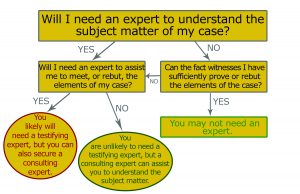Be an Expert at Experts: Expert Mistakes and How Best to Avoid Them
Click here for a printable PDF.
The Difference between a Consulting Expert and a Testifying Expert
| Consulting Expert | Testifying Expert | |
|---|---|---|
| Who is This? | An expert who has been consulted, retained, or specially employed by a party in anticipation of litigation or in preparation for trial, but who is not expected to be called as a witness either for deposition or at trial. | An expert who may be called to testify as an expert witness either in deposition or at trial. |
| What Does this Expert Do? | Assists attorneys to understand the nuances or technicalities in a case and to develop an informed litigation strategy; may review anything that helps inform. | Review and rely on those materials necessary to prepare an informed expert report and to testify. Testifying experts may also perform tasks similar to those conducted by a consulting expert. |
| How is this Type of Expert Different from the Other? | Unlike a testifying expert, a consulting expert does not form an opinion, prepare a report, or testify. Because a consulting expert does not form an opinion, materials reviewed by a consulting expert are not subject to disclosure. | Unlike a consulting expert, a testifying expert typically does not: assist with litigation strategy; conduct tests; or, analyze bad case facts or other negative materials an attorney does not want disclosed to the opposing party. |
| Are the Statements this Expert Makes or Documents She Reviews Subject to Disclosure? | Not in federal court.
See Federal Rule of Civil Procedure 26(b)(4)(D)(ii). |
Yes.
See Federal Rule of Civil Procedure 26(b)(4)(C)(i)–(iii). |
Why Hire a Consulting Expert?
Consulting experts are beneficial because neither facts known nor opinions held by a consulting expert are discoverable. Depending on the jurisdiction, a consulting expert’s identity may not be discoverable. In other words, the work of a consulting expert need not be disclosed to the opposing party, whereas the testifying expert’s opinions, notes, and work product are all discoverable. As a practical matter, a consulting expert has more latitude to become intimately familiar with the facts, issues, and litigation strategies of a case without concern that the materials upon which she relies will become discoverable.
Additionally, communications between the parties and consulting experts are more strictly protected than communications between the parties and testifying experts. Under the Federal Rules of Civil Procedure, a testifying expert’s communications with counsel are protected only if the expert does not consider the communications in forming her opinions. By contrast, an attorney’s communications with a consulting expert likely are protected by the work product doctrine.
Do not cross-contaminate your experts. Anything your consulting expert says in the presence of your testifying expert may be discoverable, defeating the purpose of retaining each type of expert.
Do I Need an Expert?
A Checklist for Protecting Confidentiality in an Expert Retainer Letter
□ Designate your expert as testifying or consulting.
□ Clearly explain how confidentiality expectations and rules apply to the expert’s work.
□ Include a brief section explaining what type of materials are considered confidential.
□ Remind the expert that, once the relationship ends, the expert must return or destroy any confidential materials acquired throughout the course of the case.
□ Consider including instructions regarding the manner in which the expert should communicate with counsel (e.g., via phone versus e-mail).
□ Changing your expert’s designation? Consider signing a new retainer letter.
* Note: Your expert is not bound by her designation indefinitely. You are permitted to change the expert’s designation within the timeframe set forth in Federal Rule of Civil Procedure 26(a)(2)(D). To reserve your right to change your expert’s designation, consider stating that the expert presently is being designated as a consulting expert but may be changed to a testifying expert if the litigation warrants such re-designation. Should you choose to re-designate your expert, check your jurisdiction’s rules regarding the effect such re-designation may have on confidential materials. Assume nothing remains confidential unless you know otherwise.



